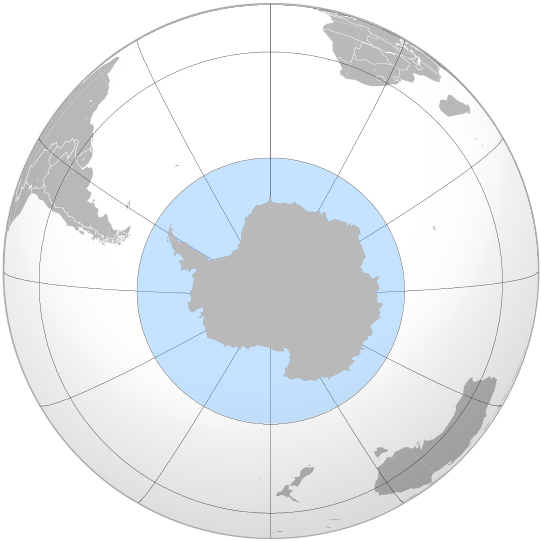Difference between revisions of "Template:Westarctica.wiki:Today's featured article"
Westarctica (talk | contribs) |
Westarctica (talk | contribs) |
||
| Line 2: | Line 2: | ||
The '''[[Southern Ocean]]''', also known as the '''Antarctic Ocean''' comprises the southernmost waters of the World Ocean, generally taken to be south of 60° S latitude and encircling the continent of [[Antarctica]]. As such, it is regarded as the fourth-largest of the five principal oceanic divisions: smaller than the Pacific, Atlantic, and Indian Oceans but larger than the Arctic Ocean. This ocean zone is where cold, northward flowing waters from the Antarctic mix with warmer subantarctic waters. | The '''[[Southern Ocean]]''', also known as the '''Antarctic Ocean''' comprises the southernmost waters of the World Ocean, generally taken to be south of 60° S latitude and encircling the continent of [[Antarctica]]. As such, it is regarded as the fourth-largest of the five principal oceanic divisions: smaller than the Pacific, Atlantic, and Indian Oceans but larger than the Arctic Ocean. This ocean zone is where cold, northward flowing waters from the Antarctic mix with warmer subantarctic waters. | ||
By way of his voyages in the 1770s, Captain James Cook proved that waters encompassed the southern latitudes of the globe. Since then, geographers have disagreed on the Southern Ocean's northern boundary or even existence, considering the waters as various parts of the Pacific, Atlantic, and Indian Oceans, instead | By way of his voyages in the 1770s, Captain James Cook proved that waters encompassed the southern latitudes of the globe. Since then, geographers have disagreed on the Southern Ocean's northern boundary or even existence, considering the waters as various parts of the Pacific, Atlantic, and Indian Oceans, instead. | ||
'''([[Southern Ocean|Full Article...]])''' | '''([[Southern Ocean|Full Article...]])''' | ||
Revision as of 06:53, 25 September 2018
The Southern Ocean, also known as the Antarctic Ocean comprises the southernmost waters of the World Ocean, generally taken to be south of 60° S latitude and encircling the continent of Antarctica. As such, it is regarded as the fourth-largest of the five principal oceanic divisions: smaller than the Pacific, Atlantic, and Indian Oceans but larger than the Arctic Ocean. This ocean zone is where cold, northward flowing waters from the Antarctic mix with warmer subantarctic waters.
By way of his voyages in the 1770s, Captain James Cook proved that waters encompassed the southern latitudes of the globe. Since then, geographers have disagreed on the Southern Ocean's northern boundary or even existence, considering the waters as various parts of the Pacific, Atlantic, and Indian Oceans, instead.
